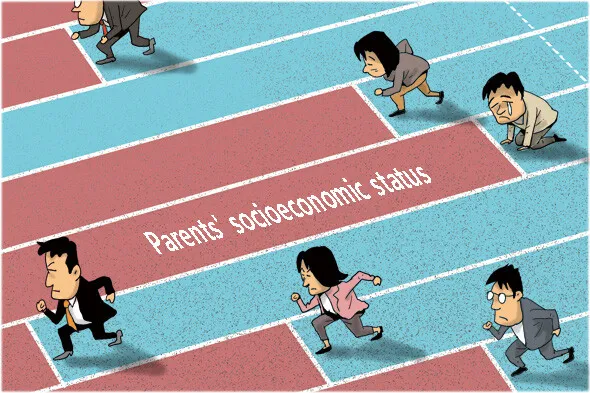hankyoreh
Links to other country sites 다른 나라 사이트 링크
[Editorial] Young people‘s despair is everyone’s responsibility

Few and unstable jobs. Steep housing costs and debt. A reality where getting a house of your own without your parents’ help is a fantasy.
These are issues shared by the young South Koreans of today. But they’re more than just the problems of a particular population segment at one point in their life cycle. They’re also things that determine the very future of the country. That explains the outpouring of calls for a societal debate and compromise to resolve the issue at a symposium on Aug. 18 to mark the opening of the Hankyoreh Economy and Society Research Institute. The institute’s society opinion center shared some of its research findings from a survey of 1,500 people 19-34 from across the country on their perceptions in these areas. The results were shocking. The picture they painted was even grimmer than the one revealed through employment indicators and other official statistics to date. The one that stands out the most may be the “vitality index,” which is calculated by asking respondents how confident they feel about their opportunities in basic areas of living like employment, housing, marriage, childbirth, and interpersonal relations. The score came out to less than 50 out of 100. On average, young people are filled much more with despair and uncertainty over the future than with hope and anticipation.
An even bigger problem revealed in the figures is the huge gap in perceptions even within the younger generation depending on their parents’ economic status and resulting circumstances. The idea of hereditary capitalism, where the starting blocks for success depend not on capability or effort but on parents’ income and assets, has deeply permeated the minds of younger people. Well over 80% of young people surveyed said South Korean society was not offering them a fair reward for their efforts; responses on whether people have the chance to come back after a failure were overwhelmingly negative.
At root, the reason so many more young people today see themselves as mired in discrimination and despair has to do with there being fewer and fewer job opportunities available. They are also very skeptical about the government’s ability to resolve this problem. A wage peak system for older employees is currently being introduced as a way of boosting youth employment, but survey data show more than 75% believe it won’t result in more jobs for young people.
Members of the older generation shouldn’t just feel sad to see this desperate reality facing young people - they ought to feel responsible. Not at the blame can be laid at the feet of the government for its ineffective policies, or companies for their neglect of responsibility. It’s time for everyone - the government, business, labor, and even politicians and civil society - to come together and try to find an answer. Economic actors who agree on the goal of increasing youth employment should be willing to ask themselves how much of a burden they are willing to take on in the interest of social compromise. It‘s also time for us to work together in drafting a “hope report.” It’s the least we can offer to young people today.
Please direct questions or comments to [english@hani.co.kr]

Editorial・opinion
![[Editorial] Inquiry must clarify if gov’t pressure led to unfair Westinghouse settlement [Editorial] Inquiry must clarify if gov’t pressure led to unfair Westinghouse settlement](https://flexible.img.hani.co.kr/flexible/normal/500/300/imgdb/original/2025/0820/5317556787190915.jpg) [Editorial] Inquiry must clarify if gov’t pressure led to unfair Westinghouse settlement
[Editorial] Inquiry must clarify if gov’t pressure led to unfair Westinghouse settlement![[Column] Does ‘KPop Demon Hunters’ count as Korean? Does it matter? [Column] Does ‘KPop Demon Hunters’ count as Korean? Does it matter?](https://flexible.img.hani.co.kr/flexible/normal/500/300/imgdb/original/2025/0820/2117556793887318.jpg) [Column] Does ‘KPop Demon Hunters’ count as Korean? Does it matter?
[Column] Does ‘KPop Demon Hunters’ count as Korean? Does it matter?- [Editorial] Trump and Putin’s Ukraine deal is a warning to countries like Korea
- [Editorial] ‘Two-track’ approach with Japan does not mean disregarding past
- [Editorial] Lee’s gestures toward North Korea, Japan are a welcome step
- [Editorial] Korea-Japan summit must acknowledge past while looking to future
- [Column] Abandon all hope, you who enter radical politics
- [Column] Can Korea say ‘no’ to the US?
- [Column] Why Yoon is cosplaying as a prisoner of conscience
- [Editorial] Cho Kuk’s pardon must serve as impetus for prosecution reform
Most viewed articles
- 1[Column] Does ‘KPop Demon Hunters’ count as Korean? Does it matter?
- 2Presidential office orders probe into KHNP’s 50-year ‘slave contract’ with Westinghouse
- 3Now in their 90s, unconverted long-term prisoners ask to be sent to North Korea
- 4Real-life heroes of “A Taxi Driver” pass away without having reunited
- 5Korea mulls how to respond if US demands ‘strategic flexibility’ of USFK at summit
- 6USFK sprayed defoliant from 1955 to 1995, new testimony suggests
- 7The welcome return of Seoul’s longstanding rhetoric of ‘peaceful unification’ of Korea
- 8Former bodyguard’s dark tale of marriage to Samsung royalty
- 9[Editorial] Trump and Putin’s Ukraine deal is a warning to countries like Korea
- 10New evidence emerges of quid pro quo in presidential residence renovation